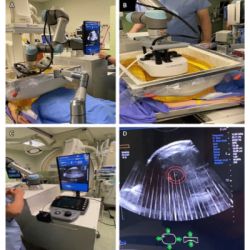Women undergoing diagnostic breast biopsies had higher scores on four different stress surveys than women undergoing minimally invasive treatments for benign and malignant disease. According to a study presented at the last Radiological Society of North America (RSNA) meeting, that feeling of anxious uncertainty can be more stressful than knowing you have a serious illness.
"Not knowing your diagnosis is a very serious stressor," said the study's lead author, Elvira V. Lang, M.D., associate professor of radiology at Harvard Medical School in Boston, Mass. "It can be as serious as knowing that you have malignant disease or need to undergo a possibly risky treatment."
Dr. Lang and her colleague, Nicole Flory, Ph.D., studied the stress levels of 214 women scheduled to undergo different diagnostic and treatment procedures. Immediately prior to the procedures, each of the women completed four standardized tests measuring stress and anxiety levels: the State Trait Anxiety Inventory (STAI), Impact of Events Scale (IES), Center for Epidemiologic Studies Depression Scale (CES-D) and Perceived Stress Scale (PSS).
Of the 214 women, 112 were awaiting breast biopsy, a diagnostic procedure to investigate a suspicious lump in the breast; 42 were awaiting hepatic chemoembolization, a treatment for liver cancer; and 60 were awaiting uterine fibroid embolization, a treatment for uterine myoma or benign fibroids.
Breast biopsy patients reported significantly higher levels of anxiety, with an average STAI score of 48, than chemoembolization patients, who had an average STAI score of 26, and fibroid embolization patients, with an average STAI score of 24.
IES scores were not significantly different, but were higher among the breast biopsy patients (average score 26) than the other patient groups (average score 23). Average CES-D scores were 15 for breast biopsy patients, 14 for chemoembolization patients and 12 for fibroid embolization patients. PSS ratings were also highest among breast biopsy patients (average rating 18), compared to fibroid embolization patients (16) and chemoembolization patients (15).
"These results really drive the point home that the distress of not knowing your diagnosis is serious," Dr. Lang said. "We believe that healthcare providers and patients are not fully aware of this and may downplay the emotional toll of having a diagnostic exam."
According to Dr. Lang, simple steps can be taken to alleviate patient stress prior to a procedure. "Training the medical team in how to talk to patients makes a huge difference," she said. "This can diffuse tension right away and can help patients to shape expectations in a more helpful fashion."























